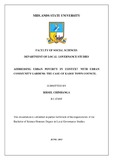Please use this identifier to cite or link to this item:
https://cris.library.msu.ac.zw//handle/11408/2804| Title: | Addressing urban poverty in context with urban community gardens: the case of Karoi town council | Authors: | Chinhanga, Birsel | Keywords: | Urban poverty Urban community gardens |
Issue Date: | 2015 | Publisher: | Midlands State University | Abstract: | The study aimed on addressing urban poverty in context with urban community gardens in the case of Karoi Town Council. The problem statement states that, due to the prevailing situation in Zimbabwe of poor economy and limited employment opportunities, urban residents are now living under poverty conditions, earning below the poverty datum line and enduring with one meal a day. So it is the core of the study to show how urban community gardens can solve such challenges and reduces urban poverty. The research objectives are; to evaluate the effectiveness of urban community gardens in reducing urban poverty, to assess the extent to which urban community gardens meet the demands of household food security, to find out challenges faced by urban community gardens beneficiaries and to identify strategies that can be used to improve the conditions of urban community gardens in Karoi town. The literature review covered several aspects upon community gardens and urban poverty. It highlighted the role of literature review to the study, which is to summarises, evaluates and clarifying the works of the study being carried out. It has also defined urban poverty, urban community gardens and urban agriculture. More so, the literature review explained the nature of poverty in the world and in the Zimbabwean context. The role of Millennium Development Goals and Sustainable Development Goals to poverty and Agriculture were also explained. Theoretical framework was explained basing on two theories which are Johanne Henry Von Thunen’s Spatial Land Theory and Cultural and Structural Poverty Theory, which explained urban farming and poverty respectively. For empirical evidence, two case studies were used which are; the case of Masizame community garden in South Africa and Gamakalle garden in Niger. Quantitative and qualitative research design was used. The target population for the study are the beneficiaries of urban community gardens of Karoi and Karoi Town Council employees. The actual population of Karoi is 28 606. The sampling technique were grouped into two, probability and non-probability sampling. For this study, purposive or judgemental sampling was used as non-probability sampling and simple random sampling as probability sampling. The sample size, are 40 community garden beneficiaries and 10 Karoi Town Council employees, which makes the total of 50 sample size. Focus group discussions, interviews and questionnaires are the research instruments used to gather data for the study. The research has found that urban community gardens are playing a pivotal role in addressing urban poverty through, income generation, increasing meals per day after harvesting, nutritional diversity, socio-economic empowerment and employment creation. The research concludes that, urban community gardens are effective in addressing urban poverty, because residents are benefiting from the gardens and their standards of life are being rising. However, although community gardens are effective, the study recommend, the legalising of urban community gardens, inclusion of urban community gardens in planning, improve urban community garden technology, increase extension services coverage and improve market linkages for urban community gardens produce. | URI: | http://hdl.handle.net/11408/2804 |
| Appears in Collections: | Bsc Local Governance Studies Honours Degree |
Files in This Item:
| File | Description | Size | Format | |
|---|---|---|---|---|
| birsel fiNAL draft.pdf | Full Text | 1.28 MB | Adobe PDF |  View/Open |
Page view(s)
100
checked on Apr 13, 2025
Download(s)
176
checked on Apr 13, 2025
Google ScholarTM
Check
Items in MSUIR are protected by copyright, with all rights reserved, unless otherwise indicated.



